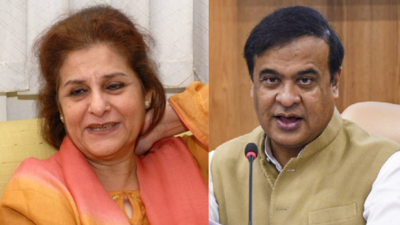ARTICLE AD BOX

GUWAHATI: Social activist and former planning commission member Syeda Hameed has triggered outrage across Assam with her assertion that "Bangladeshis can live here" while objecting to ongoing eviction drives to clear encroachers from forest lands in the state.By wading into the state's volatile immigration fault line, Hameed drew sharp political backlash, including a blistering rebuttal from chief minister Himanta Biswa Sarma. He accused her of legitimising illegal infiltration and attempting to "realise Jinnah's dream of making Assam a part of Pakistan". He said such statements threaten the cultural and demographic identity of the Assamese people. "Our identity is on the brink of extinction because of the tacit support of people like Syeda Hameed, a close confidante of the Gandhi family," he said.
"But we are the descendants of Lachit Barphukan—we will fight till the last drop of our blood to protect our land and our culture." Reacting to the remarks, Sarma on Monday posted a clip of Hameed's speech on X along with photographs of her with former PM Manmohan Singh and Assam ex-CM late Tarun Gogoi. "People like Syeda Hameed, a close confidante of the Gandhi family, legitimise infiltrators, as they seek to realise Jinnah's dream of making Assam a part of Pakistan," Sarma wrote.
Sarma made it clear that Assam would not tolerate illegal immigration. "Let me be very clear—Bangladeshis are not welcome in Assam. This is not their land. Anyone sympathising with them may accommodate them in their own homes. Assam is not up for grabs—not now, not ever," he declared. The controversy erupted on the sidelines of a seminar here on Sunday on "The Current State of the Nation and Assam's Special Circumstances" where Hameed told journalists, "What is the crime in being a Bangladeshi? Bangladeshis are also humans.
The world is so big. Bangladeshis can also live here. They are not depriving anyone of their rights. Evicting them is like ‘qayamat' (doomsday) on Muslims."Hameed added, "The world was created by Allah for humans, not for monsters. If a person is standing on this land, why uproot him so badly?"Assam Jatiya Parishad (AJP) leader Lurinjyoti Gogoi called Hameed's statement "completely unacceptable", asserting that Assam "is not a grazing ground for foreigners" as urged the govt to implement Clause 6 of the Assam Accord without delay, reinforcing the demand for identification and deportation of undocumented migrants. Echoing the sentiment, All Assam Students' Union (Aasu) president Utpal Sarma accused Hameed of disregarding the sacrifices made during the anti-foreigners' movement of Assam. "Bangladeshi nationals have already altered the state's demography," he warned, demanding a public apology from the organisers of the Assam Nagarik Sammilan (ANS), where Hameed spoke. Congress leader of opposition in the assembly, Debabrata Saikia, linked the controversy to the centre's implementation of the Citizenship Amendment Act (CAA), blaming both the Assam and central govts for failing to act on earlier promises.
"Had the Prime Minister fulfilled his 2014 pledge to deport Bangladeshi nationals, Assam wouldn't be facing this crisis," Saikia said. In response, ANS issued a clarification distancing itself from Hameed's comments, stating they were her personal views and not reflective of the Sammilan's position. "The Assam Accord is sacred," read the joint statement by Rajya Sabha MP Ajit Kumar Bhuyan and Paresh Malakar. "We demand deportation of all who entered Assam after March 25, 1971, and immediate implementation of Clause 6," the statement said. Assam has grappled with immigration-related tensions for decades, particularly since the influx of people from East Pakistan (now Bangladesh) during and after the 1971 war. The issue remains politically and socially sensitive, with concerns over demographic shifts, land encroachment, and cultural erosion. The 1985 Assam Accord, signed between the Govt of India and leaders of the Assam Movement, set March 24, 1971, as the cut-off date for citizenship. However, its implementation has been uneven, and the issue continues to fuel political discourse. Recent govt actions — including eviction drives and restrictions on Aadhaar issuance — are part of a broader push to reclaim public land and assert indigenous rights, though they have drawn criticism from rights groups.



.png)
.png)
.png)
















 3 hours ago
3
3 hours ago
3








 English (US) ·
English (US) ·